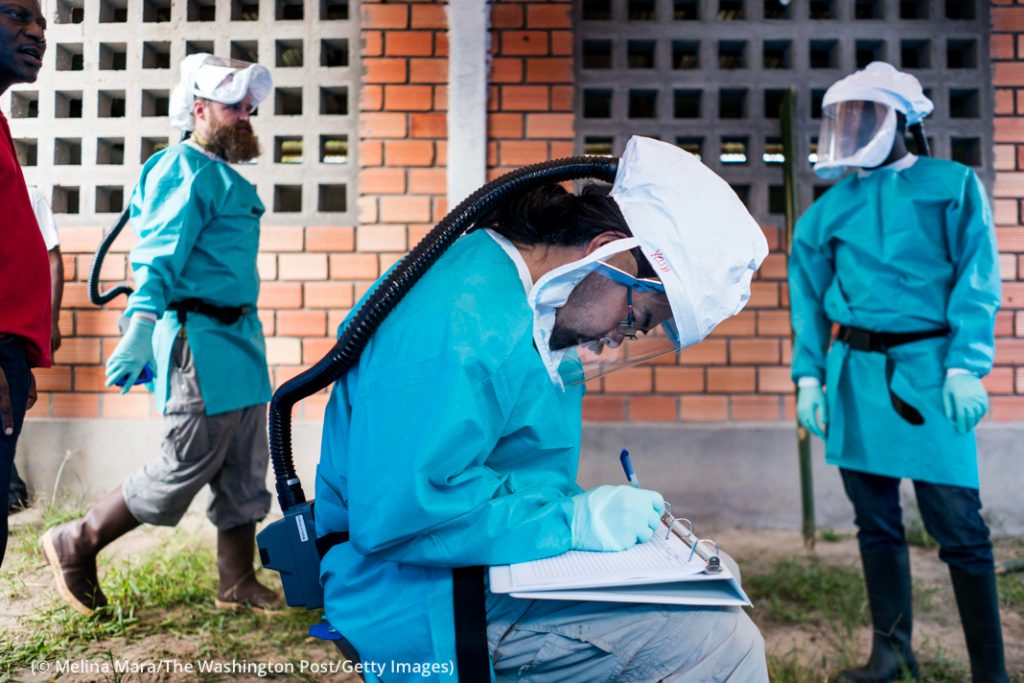Viruses do not respect national boundaries. They are a global threat. And the United States’ investment in global health has grown significantly over time.
As the largest donor to global health programs, the U.S. has led the strengthening of health systems for more than 100 years, helping to prevent and combat disease outbreaks. The American people — through both government and private entities — have given hundreds of billions of dollars to prevent, detect and respond to infectious-disease threats around the world.
In 2019 alone, the U.S. Congress appropriated $9.5 billion to support global public health to the U.S. Department of State and the U.S. Agency for International Development. This funding helped to counter HIV/AIDS, malaria, tuberculosis and pandemic threats and improved health in many other ways around the world.

Girl Guides in Nairobi await the arrival of a U.S. ambassador at a site supported by PEPFAR, the U.S. program to fight HIV/AIDS, which has saved more than 18 million lives. (© Ben Curtis/AP Images)
In addition, the United States is the single largest contributor to the World Health Organization.
Two U.S. federal agencies — as part of a whole-of-government approach — work to stem worldwide health crises: the Centers for Disease Control and Prevention and the National Institutes of Health. Both are under the U.S. Department of Health and Human Services, a Cabinet-level department.
The Centers for Disease Control and Prevention, also known as the CDC, is America’s national public health institute, working to control and prevent infectious and chronic diseases while advocating for good health. During this year’s new coronavirus pandemic (COVID-19), the CDC is the most trusted resource worldwide for accurate information on prevention and care.
The National Institutes of Health is America’s research agency responsible for making critical discoveries to improve health and save lives. With 27 institutes and centers, it is taking the lead on researching transmission as well as potential vaccines and cures for COVID-19.
The U.S. government has made a strong, continued commitment to the Global Health Security Agenda — a global effort to strengthen the world’s ability to prevent, detect and respond to infectious-disease threats. As one of 67 participating countries in the Global Health Security Agenda, the U.S. remains a leader — currently investing $288 million in 19 partner countries to strengthen and sustain their public-health readiness to contain outbreaks at their source. These partnerships lay foundations to respond to the COVID-19 pandemic and other infectious-disease threats.
Recently, the U.S. spent more than $516 million in humanitarian and medical outreach, as well as vaccine and therapeutic research, to respond to the second-largest Ebola outbreak in human history in the Democratic Republic of the Congo.
Through the President’s Emergency Plan for AIDS Relief, the U.S. has invested more than $85 billion in the global HIV response, an effort that has saved 18 million lives, prevented millions of infections and significantly strengthened partner-country health systems that are being leveraged to respond to COVID-19.
The U.S. is the largest donor to the Global Fund to Fight AIDS, Tuberculosis and Malaria and a major contributor to Gavi, the alliance that provides for lifesaving treatment of infectious diseases and immunizations for patients in the world’s neediest countries.
And so far, during this year’s new coronavirus pandemic, the U.S. government has responded with a commitment of up to $100 million to help affected and at-risk countries combat the virus.

CDC biologists and a Congolese scientist in the Democratic Republic of the Congo track animals carrying a virus. The U.S. joined the WHO and the DRC’s government to curb Ebola in 2018. (© Melina Mara/The Washington Post/Getty Images)
Beyond the U.S. government, America’s citizens and private sector routinely send millions of dollars in assistance, supplies and volunteer labor directly to those in need around the world. American volunteer doctors and nurses are often on the front lines of combating the spread of disease, including during a recent trip by Samaritan’s Purse volunteers to help Italy respond to the coronavirus crisis.
The second-largest donor to the World Health Organization (after the U.S. government) is the Bill & Melinda Gates Foundation, an American philanthropic organization. Rotary International, a truly global organization, was founded in America and for decades has led the charge globally to eradicate polio.
America’s enduring commitment to global health saves countless lives.







COMMENTS0
LEAVE A COMMENT
TOP